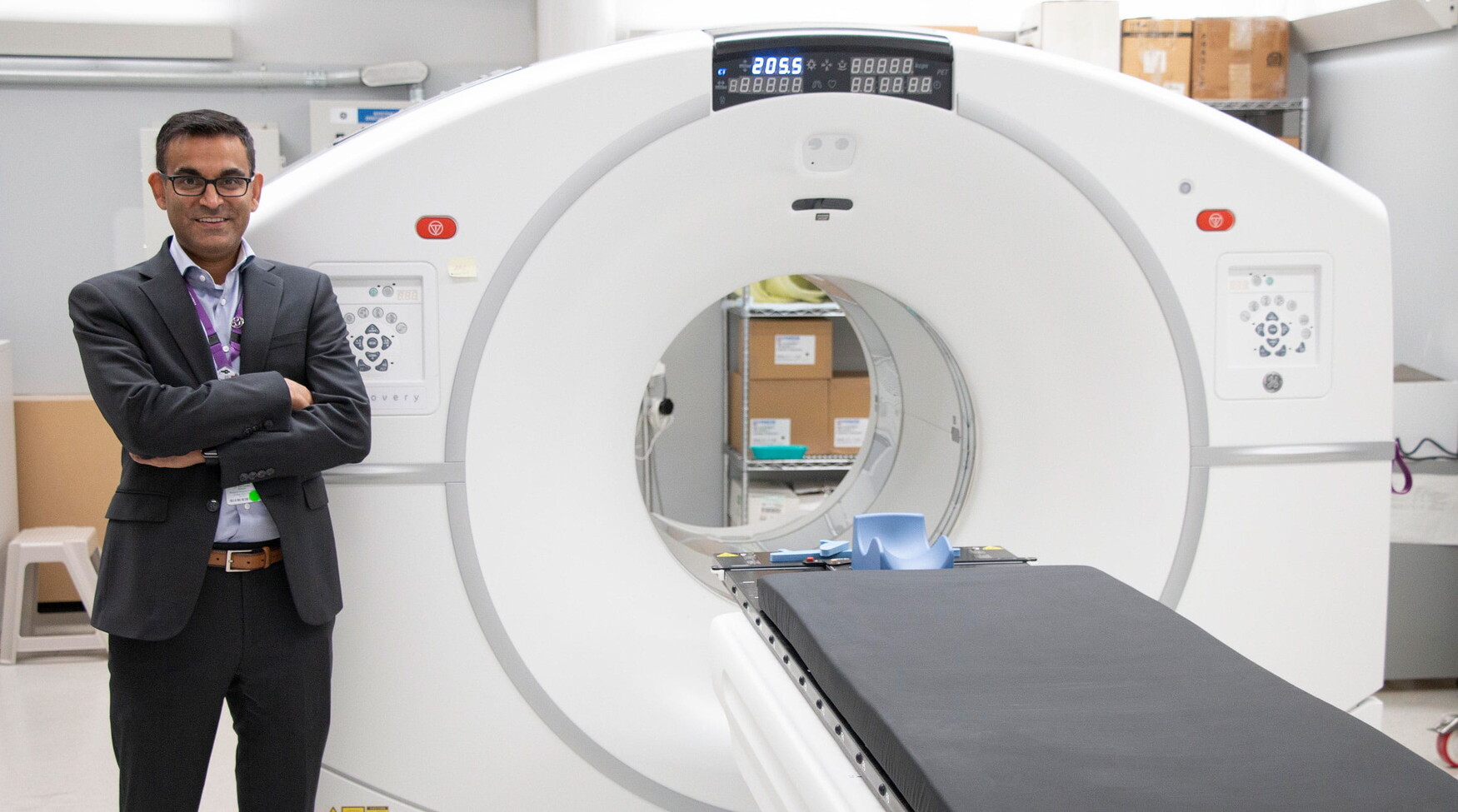Mobile Menu
- Education
- Research
-
Students
- High School Outreach
- Undergraduate & Beyond: Community of Support
- Current Students
- Faculty & Staff
- Alumni
- News & Events
- Giving
- About

The University of Toronto and the Centre for Addiction and Mental Health (CAMH) have received over $3 million to advance and commercialize radiopharmaceutical technologies for health care, and to train a new generation of scientists and clinicians.
The grant from Mitacs, a national not-for-profit organization dedicated to fostering innovation in Canada, will be matched by Canadian industries to bring the total funding to $6.75 million. The funds will create a national hub for radiopharmaceuticals anchored in the Temerty Faculty of Medicine at U of T and the Brain Health Imaging Centre at CAMH, to launch in September 2024.
“This grant will support the development of neuropsychiatric, cardiovascular and cancer imaging, radiotherapeutics and drug discovery,” said Neil Vasdev, the project lead and professor of psychiatry at Temerty Medicine, who is also director of the Brain Health Imaging Centre at CAMH. “These areas have a profound potential to improve diagnostics, treatment options, and ultimately patient outcomes.”
Justin Nodwell, vice-dean, Research and Health Science Education in Temerty Medicine and professor of biochemistry, said the hub will “transform the trainee experience” by weaving together cutting-edge technology, extensive training, and access to robust industry connections. “Our intent is to expand this approach across hospitals, institutions and research areas,” Nodwell added.
Radiopharmaceutical science — the use of drugs that contain radioactive isotopes to diagnose and treat medical conditions — is a rapidly expanding field.
U of T is the top-ranked university in Canada, and CAMH has over 30 years of experience in positron emission tomography for brain imaging, boasting top-tier infrastructure for radiopharmaceutical research that includes Toronto's inaugural two cyclotrons and 17 specialized fume hoods.
“Mitacs is excited to bridge academia with industry to advance health care,” said Ridha Ben Mrad, chief research officer and scientific director of Mitacs. “This investment addresses critical shortages in expertise and fosters transformative innovation.”
Worldwide, radiopharmaceutical researchers are retiring, leaving a potentially critical shortage of skilled professionals in the industry. The new hub will train the next generation of radiopharmaceutical scientists and help create a critical mass of highly trained personnel in Canada.
Canada is a longstanding leader in medical isotope production and has championed trainee education and research in radiopharmaceuticals. The country boasts a related ecosystem of hospital infrastructure and research laboratories and is primed for scientific advancements in the field.
The hub will align scientists with industry partners across Canada, with the goal of driving research discoveries toward commercialization. By positioning Canada as a leader in this sector, the hub will help stimulate economic growth and generate job opportunities.
Industry partners for the project include the Centre for Probe Development and Commercialization (CPDC), a global leader in the development and commercialization of radiopharmaceuticals, and adMare BioInnovations, a pan-Canadian R&D company.
"CPDC looks forward to continuing our partnership with the world class researchers at CAMH and U of T to advance and commercialize nuclear medicine for Canadians and patients worldwide," said Owen Roberts, CEO of CPDC. "This record Mitacs grant will enable us to undertake larger groundbreaking projects in the future and amplify the impact of our collaborations.”
Amie Phinney, senior director of partnerships at adMare BioInnovations said, “Science is the foundation behind new therapeutics and biotech companies are the vessels that can bring the science to patients. adMare is thrilled to support the accelerated commercialization of new medicines and to nurture the entrepreneurial spirit of scientists.”
Commercialization of research findings in radiopharmaceutical science holds significant potential for health care, from new and improved cancer treatments such as treating prostate and neuroendocrine cancers with radionucleotides, to high-precision PET diagnostic imaging for Alzheimer’s disease.
“A lack of research translation training frequently delays integration of discoveries into the health-care system,” Vasdev explained. The hub aims to expedite this process, equipping scientists with skills and strategies to market their discoveries.
“Research breakthroughs hold the promise of transforming patient care, but it's the translation of these discoveries into real-world solutions and their successful commercialization that truly impacts lives,” Vasdev said. “That’s where our new hub will shine.”

